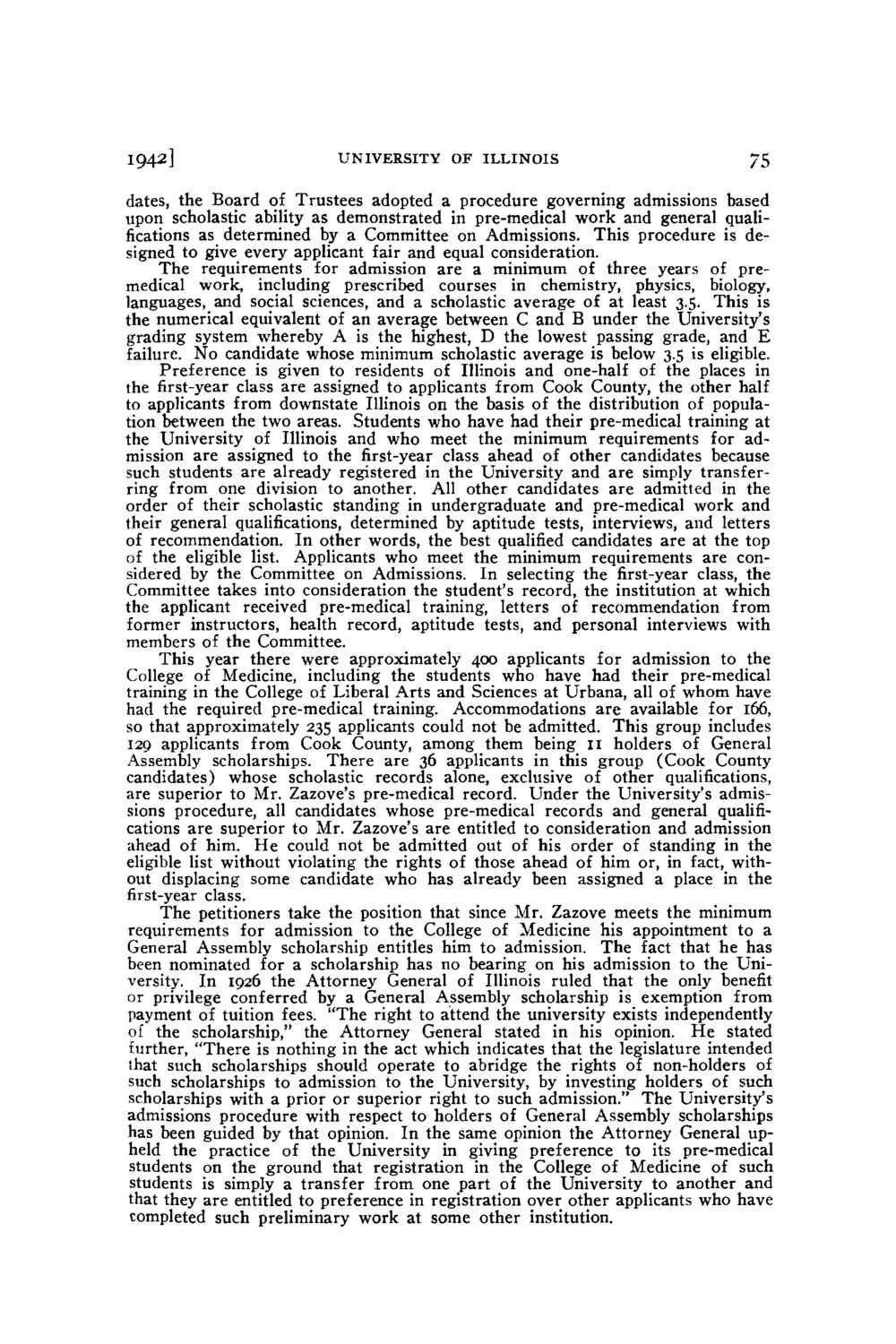| |
| |
Caption: Board of Trustees Minutes - 1944
This is a reduced-resolution page image for fast online browsing.

EXTRACTED TEXT FROM PAGE:
1942] UNIVERSITY OF ILLINOIS 75 dates, the Board of Trustees adopted a procedure governing admissions based upon scholastic ability as demonstrated in pre-medical work and general qualifications as determined by a Committee on Admissions. This procedure is designed to give every applicant fair and equal consideration. The requirements for admission are a minimum of three years of premedical work, including prescribed courses in chemistry, physics, biology, languages, and social sciences, and a scholastic average of at least 3.5. This is the numerical equivalent of an average between C and B under the University's grading system whereby A is the highest, D the lowest passing grade, and E failure. No candidate whose minimum scholastic average is below 3.5 is eligible. Preference is given to residents of Illinois and one-half of the places in the first-year class are assigned to applicants from Cook County, the other half to applicants from downstate Illinois on the basis of the distribution of population between the two areas. Students who have had their pre-medical training at the University of Illinois and who meet the minimum requirements for admission are assigned to the first-year class ahead of other candidates because such students are already registered in the University and are simply transferring from one division to another. All other candidates are admitted in the order of their scholastic standing in undergraduate and pre-medical work and their general qualifications, determined by aptitude tests, interviews, and letters of recommendation. In other words, the best qualified candidates are at the top of the eligible list. Applicants who meet the minimum requirements are considered by the Committee on Admissions. In selecting the first-year class, the Committee takes into consideration the student's record, the institution at which the applicant received pre-medical training, letters of recommendation from former instructors, health record, aptitude tests, and personal interviews with members of the Committee. This year there were approximately 400 applicants for admission to the College of Medicine, including the students who have had their pre-medical training in the College of Liberal A r t s and Sciences at Urbana, all of whom have had the required pre-medical training. Accommodations a r e available for 166, so that approximately 235 applicants could not be admitted. This group includes 129 applicants from Cook County, among them being 11 holders of General Assembly scholarships. There are 36 applicants in this group (Cook County candidates) whose scholastic records alone, exclusive of other qualifications, are superior to Mr. Zazove's pre-medical record. Under the University's admissions procedure, all candidates whose pre-medical records and general qualifications are superior to Mr. Zazove's are entitled to consideration and admission ahead of him. H e could not be admitted out of his order of standing in the eligible list without violating the rights of those ahead of him or, in fact, without displacing some candidate who has already been assigned a place in the first-year class. The petitioners take the position that since Mr. Zazove meets the minimum requirements for admission to the College of Medicine his appointment to a General Assembly scholarship entitles him to admission. The fact that he has been nominated for a scholarship has no bearing on his admission to the University. In 1926 the Attorney General of Illinois ruled that the only benefit or privilege conferred by a General Assembly scholarship is exemption from payment of tuition fees. "The right to attend the university exists independently of the scholarship," the Attorney General stated in his opinion. H e stated further, "There is nothing in the act which indicates that the legislature intended that such scholarships should operate to abridge the rights of non-holders of such scholarships to admission to the University, by investing holders of such scholarships with a prior or superior right to such admission." The University's admissions procedure with respect to holders of General Assembly scholarships has been guided by that opinion. In the same opinion the Attorney General upheld the practice of the University in giving preference to its pre-medical students on the ground that registration in the College of Medicine of such students is simply a transfer from one part of the University to another and that they are entitled to preference in registration over other applicants who have completed such preliminary work at some other institution.
| |